
In a dramatic development that has reignited decades-old tensions, campaigners have condemned the decision to prosecute a former British soldier over the Bloody Sunday killings as a "political witch hunt." The controversial move to charge Soldier F has sparked outrage among those who believe it breaches assurances given during the Northern Ireland peace process.
A Broken Promise?
Family members of those killed during the 1972 massacre have joined forces with military veterans to voice their strong opposition to the prosecution. They argue that the decision represents a fundamental betrayal of understandings reached during the Good Friday Agreement negotiations, when many believed cases from the Troubles would be laid to rest.
"This isn't about justice—it's about political point-scoring," said one campaigner closely involved with victims' families. "We were told this chapter was closed, yet here we are, half a century later, reopening wounds that should have been allowed to heal."
The Bloody Sunday Legacy
On January 30, 1972, British soldiers opened fire during a civil rights march in Derry, killing fourteen unarmed civilians and wounding many others. The event remains one of the most controversial incidents of the Northern Ireland conflict, with successive investigations and inquiries spanning decades.
The Saville Inquiry, which concluded in 2010, found that all those shot were unarmed and that the soldiers' actions were "unjustified and unjustifiable." While this brought some measure of closure to families, the recent decision to pursue criminal charges has divided opinion across communities.
Military Veterans Speak Out
Former service personnel have expressed grave concerns about the precedent this case sets for other soldiers who served during the Troubles. Many argue that prosecuting individuals for actions taken in the heat of conflict, fifty years after the events, represents a fundamental miscarriage of justice.
"Soldier F is being made a scapegoat for political purposes," a representative from a veterans' support organisation stated. "This prosecution ignores the context of the time and the immense pressures our armed forces faced in Northern Ireland."
Divided Reactions in Derry
Within the city where the tragedy occurred, opinions remain deeply split. While some families of victims continue to seek accountability, others believe the prosecution threatens to undermine the fragile peace that has been built over recent decades.
Local community leaders have expressed concern about the potential for renewed tensions, with one noting: "We've worked hard to build bridges here. Cases like this risk dismantling that progress for what many see as political theatre."
As the legal proceedings move forward, the case continues to raise profound questions about justice, legacy, and the long shadow cast by Northern Ireland's troubled past.





